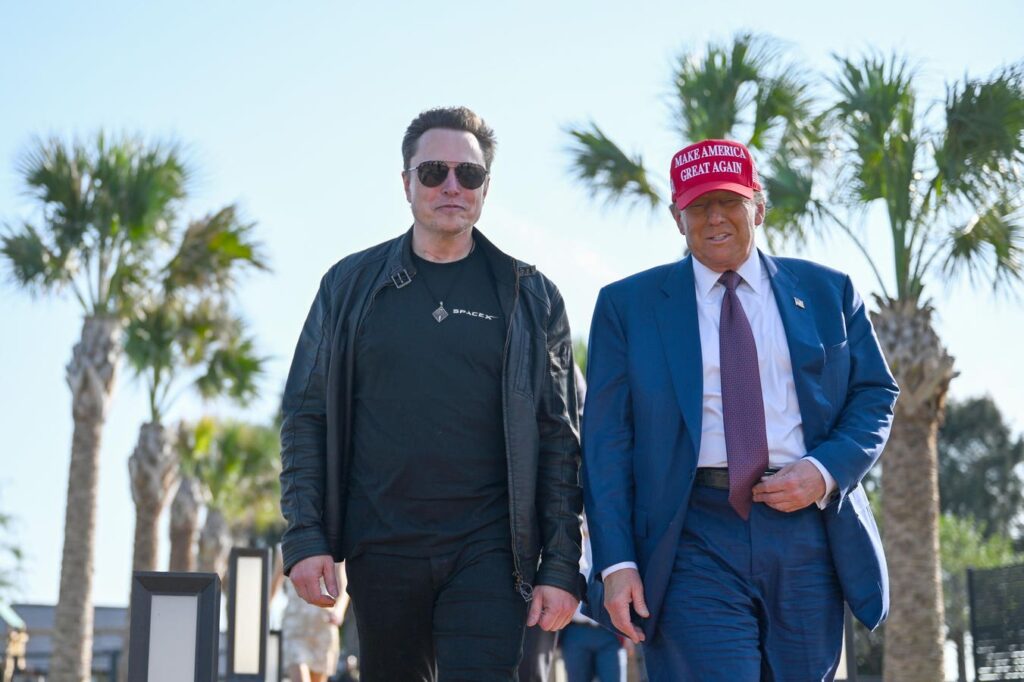Donald Trump and Elon Musk arrive for a test launch of SpaceX’s Starship rocket on November 19, 2024, in Brownsville, Texas.
Getty Images
In the barrage of attacks that President Donald Trump and Elon Musk fired at each other Thursday, one stood out: Trump’s threat to cancel federal contracts with companies owned by the world’s richest man.
The primary target: SpaceX, which has received at least $21 billion in government contracts, with about $13 billion still outstanding.
Musk probably doesn’t have much to fear. Legally, the Trump administration would likely enmire itself in lengthy legal disputes if it appeared to cancel contracts out of spite. Moreover, as the world’s No. 1 launch provider and maker of low-Earth orbit satellites, SpaceX may have made itself indispensable.
“The [U.S. government] is simply too locked in to cut them off over a social media meltdown,” said Kimberly Siversen Burke, director of government affairs at the consultancy Quilty Space.
Nonetheless, there are some types of contracts that could be vulnerable for cancellation, and ways the government could lessen its dependence on SpaceX going forward.
IN A CLASS BY ITSELF
The 134 rockets SpaceX launched last year accounted for 83% of all satellites put into orbit worldwide. With its reliable, partially reusable Falcon 9, the company has come to dominate U.S. national security launches. Its chief competitor, United Launch Alliance, a joint venture of Boeing and Lockheed Martin, has struggled to keep up, with multiyear delays in developing its new Vulcan rocket.
The U.S. government may have more options to carry its military satellites to space going forward. Vulcan is now operational and Blue Origin, the space company founded by Musk’s billionaire rival Jeff Bezos, pulled off a successful first launch of its New Glenn rocket in January. In the latest round of contracts awarded by Space Force, SpaceX won 28 launches from 2027 through 2032, a little more than half, with ULA getting 19 and Blue Origin seven.
But ULA and Blue Origin have their hands full scaling up, said Todd Harrison, a defense and space analyst with the American Enterprise Institute. “There’s no replacing SpaceX. You just do not have the capacity in our other launch options.”
SpaceX has also become a major supplier of national security satellites. The National Reconnaissance Office is depending on SpaceX to build out a multibillion-dollar network of hundreds of spy satellites in low-Earth orbit based on the company’s Starshield platform.
For delivering cargo and astronauts to the International Space Station, NASA has also had to rely on SpaceX, as Boeing has struggled to fix defects in its Starliner spacecraft.
But there are some relatively small-dollar SpaceX contracts that could be vulnerable, said Burke. The government could lower its exposure to SpaceX by looking for early phase development programs that don’t have a contractor locked in yet.
For example, SpaceX has won roughly $140 million in contracts on an Air Force program to test whether commercial satellite services can be integrated into tactical military communications, Burke said.
Another way Trump could hurt Musk, as well as Ukraine, would be to cancel or reduce a $537 million contract to provide Starlink satellite communications services to the Ukrainian military.
But rather than targeting existing contracts, where the administration could make a greater impact is by steering new business to others and reorienting its plans. The Commerce Department could backtrack on a revamp announced in March to a $42 billion program to expand rural broadband access that was expected to make Starlink eligible to compete for grants. Till now the program has only included telecom companies laying fiber-optic cables.
Trump could also pull back from the support he promised in his inaugural address for Musk’s ultimate ambition: to reach Mars. “Where Trump can single handedly harm SpaceX in a significant way is redirecting the mission goals for NASA,” Harrison said.
Given how mercurial Musk has proven to be, perhaps diversifying away from SpaceX isn’t a bad idea. Burke worries, however, that the bad blood will undo years of work to convince the Pentagon and other national security agencies that they can rely on any commercial companies. “Elon’s antics are threatening to rewind the tape,” she said.
MORE FROM FORBES
Read the full article here
